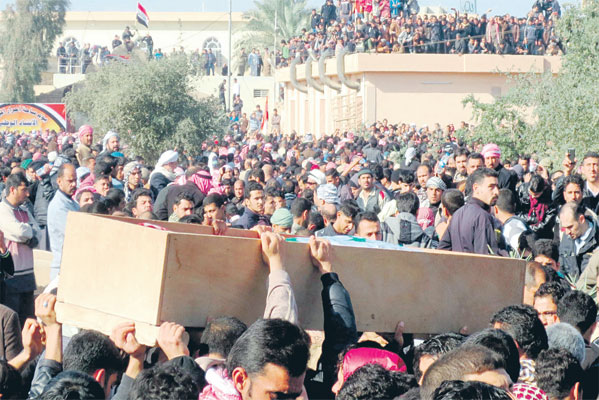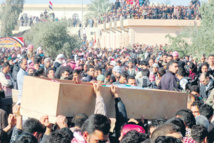Forty-four Iraqi MPs announced their resignation following the violence, which came just days after a deadly raid on the home of a Sunni lawmaker in the city, capital of restive Anbar province.
A similar operation at a Sunni protest camp outside the northern town of Hawijah in April triggered clashes that killed dozens of people, sparking a wave of revenge attacks and sending death tolls soaring.
Dr Ahmed al-Ani of Ramadi hospital said 10 gunmen were killed and 30 wounded on Monday.
An AFP journalist in Ramadi reported heavy fighting, and saw helicopters firing into the area of the protest site, where demonstrators had gathered for more than a year.
Gunmen also burned two security forces vehicles and seized a third.
Sporadic clashes continued, and gunmen could be seen on some Ramadi streets, while security forces were visible at the edge of the city.
The fighting spread to the nearby city of Fallujah, where police Captain Omar Oda said militants burned military vehicles during clashes with security forces.
Dr Assem al-Hamdani said 11 gunmen were wounded.
Forty-four MPs announced their resignation on Monday evening, triggering the latest in a long line of political crises.
Demand for army withdrawal
The MPs also demanded "the withdrawal of the army... and the release of MP Ahmed al-Alwani," a Sunni who was arrested during a deadly raid on Saturday.
Prime Minister Nuri al-Maliki's spokesman, Ali Mussawi, said military sources confirmed tents at the protest site had been removed and the highway towards neighbouring Jordan and Syria reopened.
This was done "without any losses, after Al-Qaeda and its members escaped from the camp to the city, and they are being pursued now," Mussawi told AFP.
He was echoing a charge made on December 22 by Maliki, who said "the sit-in site in Anbar has turned into a headquarters for the leadership of Al-Qaeda".
Footage broadcast on state television showed security forces stripping cloth exteriors from large, metal-framed tents at the camp.
The sprawling protest site on the highway outside Ramadi, where the number of protesters ranged from hundreds to thousands, included a stage from which speakers could address crowds, a large roofed structure and dozens of tents.
Protests broke out in Sunni Arab-majority areas of Iraq late last year after the arrest of guards of then-finance minister Rafa al-Essawi, an influential Sunni Arab, on terrorism charges.
The arrests were seen by Sunnis as yet another example of the Shiite-led government targeting one of their leaders.
In December 2011, guards of vice president Tareq al-Hashemi, another prominent Sunni politician, were arrested and accused of terrorism. Hashemi fled abroad and has since been given multiple death sentences in absentia for charges including murder.
The demonstrations tapped into longstanding grievances of Sunni Arabs, who say they are both marginalised by the government and unfairly targeted by security forces.
In another incident that has escalated tensions, security forces on Saturday raided the Ramadi home of Sunni Arab MP Ahmed al-Alwani, who backs the anti-government protesters, arresting him and sparking clashes that killed his brother, five guards and a security forces member.
Sunni discontent has been a key factor in escalating violence this year, boosting recruitment for militant groups and eroding cooperation with security forces.
But while the government has made some concessions aimed at placating Sunni Arabs, including freeing prisoners and raising the salaries of anti-Qaeda militiamen, underlying issues remain unaddressed.
Nationwide death tolls from violence have reached a level not seen since 2008, when Iraq was just emerging from a brutal period of sectarian killings.
The violence continued elsewhere on Monday, with at least 17 people, among them eight security forces members, killed in attacks.
More than 6,750 people have been killed in violence since the beginning of the year, according to AFP figures based on security and medical sources.
---------------------------------------------------------------------------------------------------------
A similar operation at a Sunni protest camp outside the northern town of Hawijah in April triggered clashes that killed dozens of people, sparking a wave of revenge attacks and sending death tolls soaring.
Dr Ahmed al-Ani of Ramadi hospital said 10 gunmen were killed and 30 wounded on Monday.
An AFP journalist in Ramadi reported heavy fighting, and saw helicopters firing into the area of the protest site, where demonstrators had gathered for more than a year.
Gunmen also burned two security forces vehicles and seized a third.
Sporadic clashes continued, and gunmen could be seen on some Ramadi streets, while security forces were visible at the edge of the city.
The fighting spread to the nearby city of Fallujah, where police Captain Omar Oda said militants burned military vehicles during clashes with security forces.
Dr Assem al-Hamdani said 11 gunmen were wounded.
Forty-four MPs announced their resignation on Monday evening, triggering the latest in a long line of political crises.
Demand for army withdrawal
The MPs also demanded "the withdrawal of the army... and the release of MP Ahmed al-Alwani," a Sunni who was arrested during a deadly raid on Saturday.
Prime Minister Nuri al-Maliki's spokesman, Ali Mussawi, said military sources confirmed tents at the protest site had been removed and the highway towards neighbouring Jordan and Syria reopened.
This was done "without any losses, after Al-Qaeda and its members escaped from the camp to the city, and they are being pursued now," Mussawi told AFP.
He was echoing a charge made on December 22 by Maliki, who said "the sit-in site in Anbar has turned into a headquarters for the leadership of Al-Qaeda".
Footage broadcast on state television showed security forces stripping cloth exteriors from large, metal-framed tents at the camp.
The sprawling protest site on the highway outside Ramadi, where the number of protesters ranged from hundreds to thousands, included a stage from which speakers could address crowds, a large roofed structure and dozens of tents.
Protests broke out in Sunni Arab-majority areas of Iraq late last year after the arrest of guards of then-finance minister Rafa al-Essawi, an influential Sunni Arab, on terrorism charges.
The arrests were seen by Sunnis as yet another example of the Shiite-led government targeting one of their leaders.
In December 2011, guards of vice president Tareq al-Hashemi, another prominent Sunni politician, were arrested and accused of terrorism. Hashemi fled abroad and has since been given multiple death sentences in absentia for charges including murder.
The demonstrations tapped into longstanding grievances of Sunni Arabs, who say they are both marginalised by the government and unfairly targeted by security forces.
In another incident that has escalated tensions, security forces on Saturday raided the Ramadi home of Sunni Arab MP Ahmed al-Alwani, who backs the anti-government protesters, arresting him and sparking clashes that killed his brother, five guards and a security forces member.
Sunni discontent has been a key factor in escalating violence this year, boosting recruitment for militant groups and eroding cooperation with security forces.
But while the government has made some concessions aimed at placating Sunni Arabs, including freeing prisoners and raising the salaries of anti-Qaeda militiamen, underlying issues remain unaddressed.
Nationwide death tolls from violence have reached a level not seen since 2008, when Iraq was just emerging from a brutal period of sectarian killings.
The violence continued elsewhere on Monday, with at least 17 people, among them eight security forces members, killed in attacks.
More than 6,750 people have been killed in violence since the beginning of the year, according to AFP figures based on security and medical sources.
---------------------------------------------------------------------------------------------------------









 Home
Home Politics
Politics











